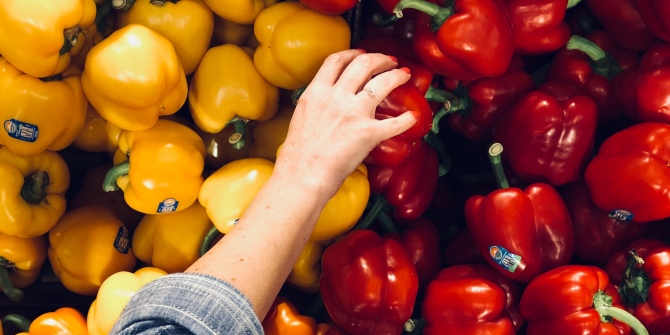
Economic growth has helped millions out of poverty. The jobs it creates mean rising incomes and consumers who buy more. This drives further growth and higher living standards, including better health and education. Yet WWF, the World Wildlife Fund, has recently warned that exploding human consumption is the driving force behind unprecedented planetary change, through increased demand for energy, land and water.
Plastics and microplastics are filling our oceans and rivers and entering the food chain. The production of goods and services for household use is the most important cause of greenhouse gas emissions. The textile industry is responsible for depleting and polluting water resources and committing human rights abuses against its workers. It is also a major source of greenhouse gases, and three fifths of all clothing produced ends up in incinerators or landfills within a year of being made.
In this ‘live’ episode of the podcast LSE IQ, recorded in front of an audience at LSE at the beginning of November 2018, Jo Bale and Sue Windebank ask, ‘Can we afford our consumer society?’
♣♣♣
Notes:
- For further information about the podcast visit lse.ac.uk/iq
- The post gives the views of its authors, not the position of LSE Business Review or the London School of Economics.
- Featured image credit: Photo by KenFukunaga, under a Pixabay licence
- When you leave a comment, you’re agreeing to our Comment Policy.
 Joanna Bale is co-host and co-producer of the LSE IQ podcast and a senior media relations manager at LSE. She was previously a staff reporter at The Times of London.
Joanna Bale is co-host and co-producer of the LSE IQ podcast and a senior media relations manager at LSE. She was previously a staff reporter at The Times of London.
 Rebecca Elliott is an assistant professor in LSE’s department of sociology. She has a PhD in sociology from the University of California, Berkeley. Her research interests span economic sociology, political sociology, environmental sociology and knowledge production and science studies.
Rebecca Elliott is an assistant professor in LSE’s department of sociology. She has a PhD in sociology from the University of California, Berkeley. Her research interests span economic sociology, political sociology, environmental sociology and knowledge production and science studies.
 Ian Gough is a visiting professor at LSE’s Centre for the Analysis of Social Exclusion and an associate at the Grantham Research Institute on Climate Change and the Environment.
Ian Gough is a visiting professor at LSE’s Centre for the Analysis of Social Exclusion and an associate at the Grantham Research Institute on Climate Change and the Environment.
 Rodolfo Leyva is a fellow in LSE’s department of media and communications.
Rodolfo Leyva is a fellow in LSE’s department of media and communications.
 Sue Windebank is co-host and co-producer of the LSE IQ podcast and a senior media relations manager at LSE. She has also worked in science communication and environmental campaigning.
Sue Windebank is co-host and co-producer of the LSE IQ podcast and a senior media relations manager at LSE. She has also worked in science communication and environmental campaigning.






Transcript, please!
Hi Timothy, unfortunately we don’t have a transcript. I will pass it on to the producers as a suggestion. Thanks for your interest!